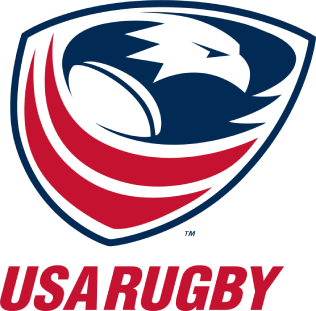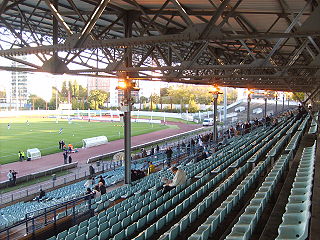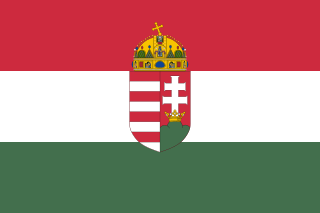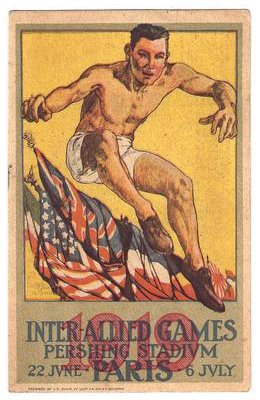
The 1924 Summer Olympics, officially the Games of the VIII Olympiad and also known as Paris 1924, were an international multi-sport event held in Paris, France. The opening ceremony was held on 5 July, but some competitions had already started on 4 May. The Games were the second to be hosted by Paris, making it the first city to host the Olympics twice.
Football at the 1924 Summer Olympics was the sixth edition of the football tournament at the 1924 Summer Olympics held in Paris.

The Stade de France is the national stadium of France, located just north of Paris in the commune of Saint-Denis. Its seating capacity of 80,698 makes it the largest stadium in France. The stadium is used by the French national football and rugby union teams for international competitions. It is the largest in Europe for track and field events, seating 78,338 in that configuration. During other events, the stadium's running track is mostly hidden under the football pitch.

Parc des Princes is an all-seater football stadium in Paris, France. It is located in the south-west of the French capital, inside the 16th arrondissement, near the Stade Jean-Bouin and Stade Roland Garros.

Rugby union has been a men's medal sport at the modern Summer Olympic Games, being played at four of the first seven competitions. The sport debuted at the 1900 Paris games where the gold medal was won by the host nation. It was subsequently featured at the London games in 1908, the Antwerp games in 1920 and the Paris games in 1924.

The United States men's national rugby union team, nicknamed the Eagles, represents the United States of America Rugby Football Union in men's international rugby union. USA Rugby is the national governing body for the sport of rugby union in the United States, and is a member of Rugby Americas North, one of six regional governing bodies under World Rugby. Until rugby returned to Olympic competition, with sevens at the 2016 Rio Games, the United States was the reigning Olympic rugby champion, having defeated the one other competitor in 1920 and the two other competitors at the 1924 Summer Olympics.

The Stade Yves-du-Manoir is a rugby, track and association football stadium in Colombes, near Paris, France.

The Vélodrome de Vincennes is a cycling stadium in the Bois de Vincennes, Paris, France.

In rugby union at the 1924 Summer Olympics held in Paris, United States won the gold medal, beating France in an upset in front of a partisan crowd.

Uruguay competed in the Summer Olympic Games for the first time at the 1924 Summer Olympics in Paris, France.

The modern Olympic Games were founded by French historian Pierre de Coubertin. France has competed in every edition, with the possible exception of the 1904 Games.

The Stade Jean-Bouin is a multi-purpose stadium in the 16th arrondissement of Paris, France. The 19,904 capacity facility is located across the street from the much larger Parc des Princes, and is used mostly for rugby union, but is also used for American football and association football matches. It is the home stadium of Stade Français, Paris Musketeers and FC Versailles.

The United States competed at the 1924 Summer Olympics in Paris, France. 299 competitors, 275 men and 24 women, took part in 108 events in 18 sports.

Italy competed at the 1924 Summer Olympics in Paris, France. 200 competitors, 196 men and 4 women, took part in 93 events in 18 sports.

Hungary competed at the 1924 Summer Olympics in Paris, France, returning to the Olympic Games after not being invited to the 1920 Games because of the nation's role in World War I. 89 competitors, 86 men and 3 women, took part in 54 events in 12 sports.

Czechoslovakia competed at the 1924 Summer Olympics in Paris, France. 133 competitors, 129 men and 4 women, took part in 75 events in 16 sports.

Romania competed at the 1924 Summer Olympics in Paris, France. It was the first time that Romania sent a team to compete at the Olympic Games, and the second appearance overall after a lone Romanian athlete competed at the 1900 Summer Olympics. 35 competitors, all men, took part in 7 events in 4 sports.

Stade Pershing was a multi-purpose stadium in the Bois de Vincennes in Paris, France. It was used mostly for football matches and hosted the final of the Coupe de France on four occasions. It hosted the Inter-Allied Games in 1919 and the first Women's World Games in 1922. It also hosted some of the football matches during the 1924 Summer Olympics. The stadium was able to hold 29,000 spectators at its height; it opened in 1919 and closed in 1960. Its area currently hosts baseball games.

Tremblay Park (French: parc du Tremblay is a park of 73 hectares offering games and sporting activities. It is located in the commune of Champigny-sur-Marne, in the department of Val-de-Marne in Paris urban area. Sporting facilities include a track field, golf, soccer, archery, volleyball and rugby. This park is jointly administered by the general council of Val-de-Marne and the Council of Paris

Rugby sevens was played at the Olympics for the first time at the 2016 Summer Olympics, with both men's and women's contests. It was added to the Olympics following the decision of the 121st IOC Session in Copenhagen in October 2009. The champions for the inaugural rugby sevens tournament in 2016 were Fiji for the men and Australia for the women. Prior to 2016, 15-a-side matches were played in 1900, 1908, 1920, and 1924.





















